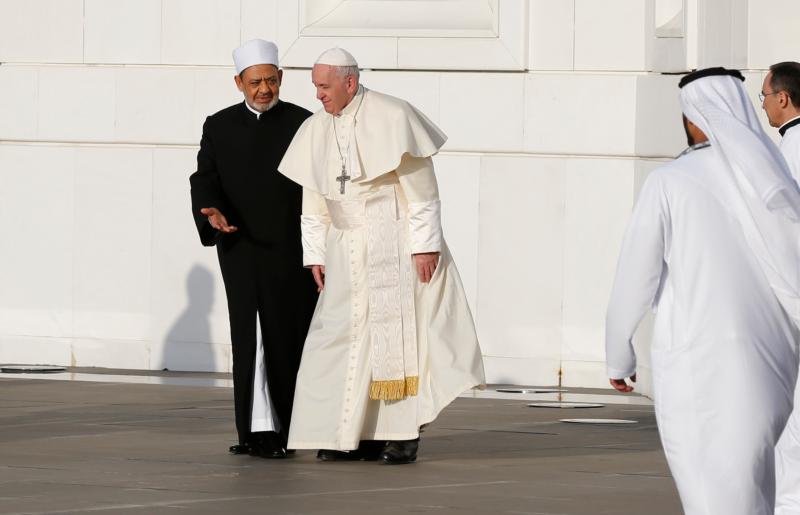By Inés San Martín

ABU DHABI — Pope Francis came to the United Arab Emirates to attend an interreligious gathering taking place in Abu Dhabi.
He is not the only heavy-hitter addressing the event, Patriarch Kirill of the Russian Orthodox Church, although not attending the Human Fraternity Meeting, sent a message to the conference condemning using religion as a basis for violence.
“The use of religion-linked rhetoric to justify terrorism or attain one’s political goals is a sin which must be resolutely condemned by spiritual leaders and all people of good will,” Kirill said.
According to the Patriarch of Moscow and All Russia, today the world sees “unprincipled politicians” who “tend to use religion as an instrument for manipulation of public conscience.”
Kirill’s words were partially reproduced by Tass, the Russian news agency.
The conference is taking place in a Muslim-majority country where religious minorities are “tolerated” but do not have full religious liberty. Kirill noted that the Middle East has seen all forms of extremists, hiding behind religious slogans and it’s also suffered the conflict of geopolitical interests in various countries.
“Religious and national minorities suffered real genocide in a number of countries. Enormous damage has been done to Christian presence: hundreds of churches have been destroyed, many families have lost their homes and money, people continue to flee their homes as they have no guarantees of a peaceful future,” he said.
Kirill also said that the people of different religions are called to help the suffering people of Syria, Iraq, and other war-torn countries by demonstrating a firm commitment to “God-given moral ideas of love, peace, good neighborly relations and mercy.”
A Human Fraternity meeting
Some 700 religious leaders are participating in the summit, with delegates from other Christian denominations as well as Jewish, Hindu, Sikh and Buddhist leaders. On Sunday, hey explored topics such as interreligious dialogue, oppression of religious communities and ways to tackle extremism.
Among them was Indian Archbishop Felix Machado, who told Crux that Sunday was a “long” day of talks, many of which were excellent, while others were “things we have heard repeatedly.”
Regardless, he noted he was struck by the potential of what he described as a “Muslim opening-up” in contrast to the populism of the “Muslim spring.”
Archbishop Machado, who served as Under-Secretary of the Pontifical Council for Interreligious Dialogue at the Vatican from 1999-2008, is attending the gathering as a guest of the Muslim Council of Elders.
He told Crux on Monday that he sees a “sign of hope” for the future of interreligious dialogue in general, with Christians perhaps seeing the fruits of dialogue.
Muslims, he said, have moved to “tolerance,” a word he defined as positive despite its possible negative interpretations. Archbishop Machado added that he wants to see Muslims keep up the “tempo” of the dialogue that took place in Abu Dhabi, and added that the papal visit will help all Christians in the region.
Dialogue, the archbishop said, is the only alternative to hatred, conflicts, and violence committed in the name of God.
A “red letter day” for the peninsula
According to Bishop Paul Hinder, apostolic vicar of Southern Arabia, whose flock include the UAE, Oman and Yemen, the first ever papal visit to the Arabian Peninsula is a “red letter day.”
“It seems only fitting that one of the world’s most cherished proponents of tolerance and peace is finally setting foot in a country that has long championed and preserved these values,” Hinder wrote in a statement released on Sunday, upon Pope Francis’s arrival.
He also said that he prayed for the pope’s meeting with the Grand Imam and other religious leaders may lead to a “paradigm shift not just in relations between Christians and Muslims but in people’s thoughts and minds around the world when it comes to religious freedom and acceptance of each other’s beliefs!”
Bishop Hinder said that the UAE “pioneering rulers” set the bar for leadership in the region, “one that is testimony to the power of tolerance.”
“Our world today is becoming increasingly fragmented, contentious and divisive; and the gap between poverty and plenty continues to widen,” he wrote. “More than a third of the global population is displaced and the migration crisis has reached fever pitch. The resonance of this visit to the United Arab Emirates, where people of over 200 nationalities live and work in harmony, will ring loud for years to come.”
The pontiff will close the conference when he delivers the first of two speeches during a ceremony at the Founders Memorial. He will be joined by Abu Dhabi’s Crown Prince Sheikh Mohammed bin Zayed al-Nahyan and Professor Ahmed a-Tayyeb, Grand Imam of Al-Azhar University in Cairo, the foremost educational institution in Sunni Islam.

Politicians are important. We need to pray for their well-being and health.